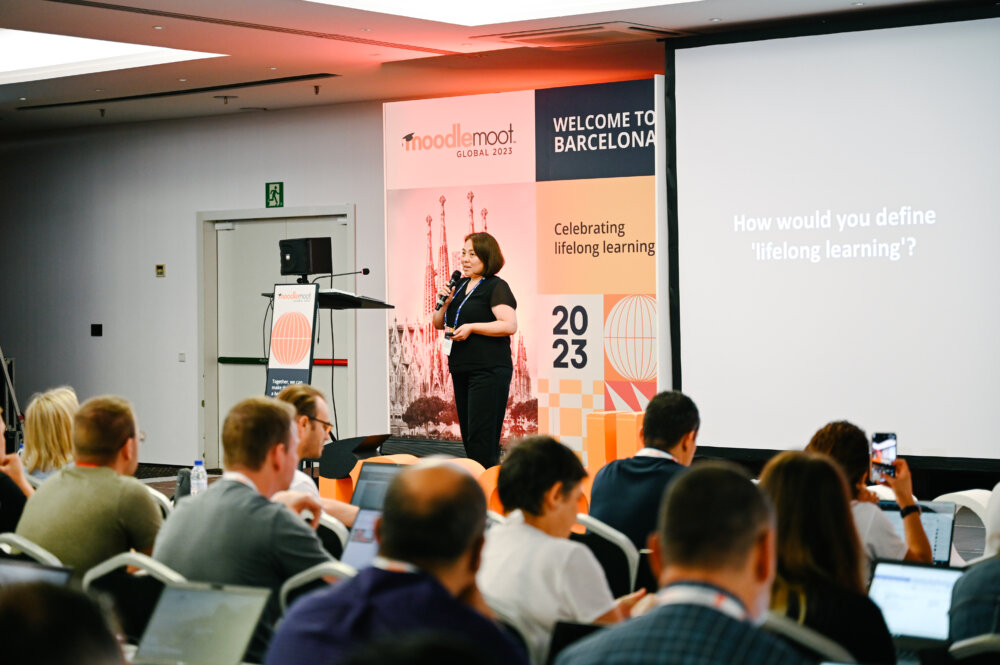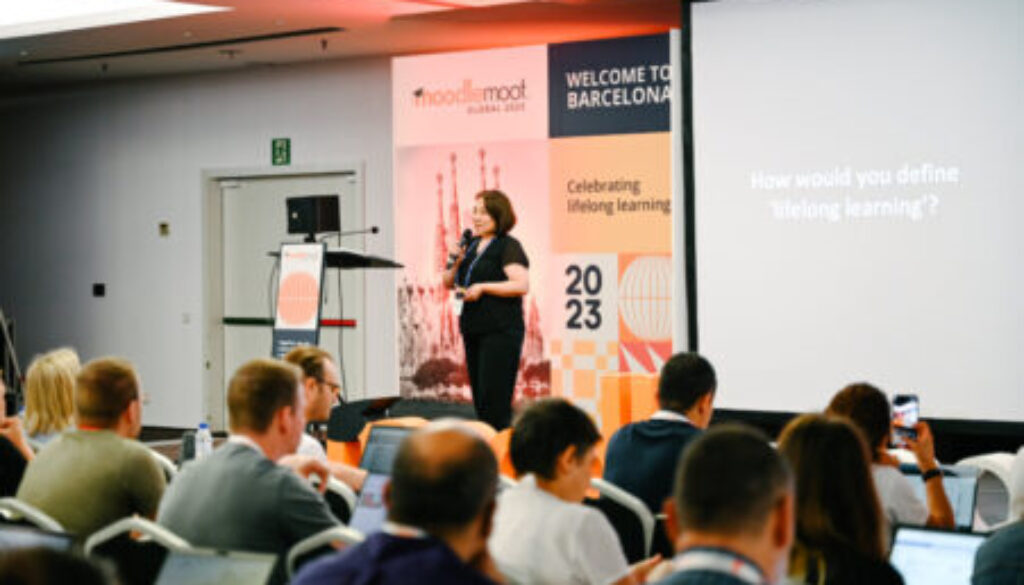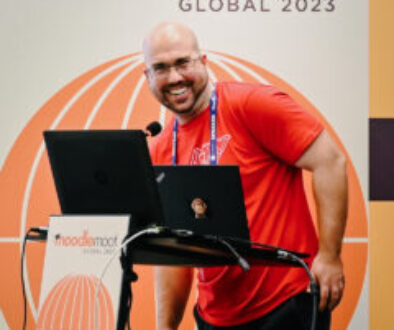MoodleMoot Global 2023 Daily wrap-up: Day 2 offered intriguing sessions and crowned in celebration
Before we get in to today’s daily update, a quick note to say that the Moodle Party will start at 20:30 tonight (not 20:00 as previously advertised.) We’ll see you at Otto Zutz club soon!
Day 2 of MoodleMoot Global 2023 was packed with plenty of moments that left attendees brimming with insights and ideas. From keynote sessions such as “Lifelong learning’s past, present, and future” to government initiatives to promote education and collaborative success stories, here’s a quick look at the key highlights of the day. And, of course, a little something special to cap it all off – the Moodle Party!
Welcome speech and keynote
On Day 2 of MoodleMoot Global 2023, Abby Fry, the Head of Marketing and Communications at Moodle, greeted attendees. She introduced the key highlights of the day: a keynote by Rakhat Zholdoshalieva, an excellent lineup of workshops and presentations, and the upcoming 80s-themed Moodle Party at Otto Zutz Club.
Following Abby’s welcome note, Rakhat Zholdoshalieva, team leader for the Quality Learning Ecosystems Program at the UNESCO Institute for Lifelong Learning, delivered her keynote on “Lifelong Learning: Past, Present, and Future.” Her engaging presentation took attendees on a journey through the evolution of lifelong learning, emphasising its historical significance and contemporary relevance.
Rakhat also provided valuable insights into the extensive efforts of the United Nations and UNESCO Institute for Lifelong Learning in advancing lifelong learning. She shared the global goals and initiatives that underscore the importance of continuous education throughout one’s life. Moreover, Rakhat offered a glimpse into the future of the field, illustrating how it is poised to shape our educational landscapes for years to come.
Rakhat’s presentation provided a comprehensive exploration of lifelong learning as a vital educational concept.

During the presentation, Rakhat engaged the audience by posing a pivotal question: “Why is lifelong learning important now and in the future?” This question led to a spirited discussion amongst the audience, who shared their views on the relevance of lifelong learning in today’s global context.
Moreover, Rakhat connected lifelong learning to the Sustainable Development Goals (SDGs), particularly SDG 4, which aims to ensure inclusive and equitable quality education and promote lifelong learning opportunities for all. She pointed out the challenges in achieving this goal, addressing disparities in access to education, and managing limited financial resources amidst unpredictable natural disasters.
Rakhat’s presentation concluded with a call to action, urging individuals to contribute to the promotion of lifelong learning. She emphasised the importance of literacy and numeracy for all, as well as the role of citizens in advocating for increased investment in education and reducing reliance on the private sector.
From innovative workshops to rediscovering the transformative potential of Moodle
Among the sessions held during the first half, Martin Dougiamas, the Founder of MoodleHQ, led an Open EdTech Innovation Workshop that was full of valuable ideas and innovative solutions. The workshop aimed to encourage attendees to think creatively about how to incorporate technology into education and to consider new ways to enhance the learning experience.
Aurélie Soulier, Community Engagement Lead at Moodle HQ, discussed the strength of a united community in an ever-evolving digital world. In her presentation, ‘Shaping the future of Moodle together: The power of community & collaboration’, she focused on the collective power of individual strengths that contribute in different ways such as translating language strings, developing plugins, supporting UX research, and co-designing courses on Moodle Academy. Aurélie stated that the Moodle community is where all individual efforts come together to build our LMS and other services globally.
She also explained what the future holds at Moodle in the context of community engagement. There will be several initiatives that will be aimed at expanding community roles in breaking down language and geographical barriers. This will also involve improving multi-lingual cross-language interactions to maximise the value of the community contributions.
In another thought-provoking session, Albina Bardhi from the Department of Product Development at Praktika.al presented about ‘Revolutionising vocational education through digital transformation’ with the MësoVET Project in Albania. She painted a picture of the critical issue of youth unemployment in Albania and the parallel problem faced by employers to locate qualified employees. These challenges brought to light the necessity for a transformative approach to vocational education, one that could better prepare students for the workforce while providing employers with skilled candidates.
Albina explained how Moodle helped address the challenges of unemployment in Albania. Source: Moodle.
In 2019, Praktika.al initiated the MësoVET project, a Moodle-based platform designed to address these challenges. Albina described how the project adopted a holistic approach by embracing Moodle Workplace. It created independent sites for each Vocational Education and Training (VET) school, with a primary focus on developing digital learning materials that would enhance the quality of education and provide students with the necessary digital skills for today’s job market.
Albina also stressed the importance of having digital literacy within VET schools. The support came from digital experts who helped teachers and students navigate the technical aspects of the Moodle-based platform. Their presence is crucial in bridging the digital divide and ensuring that the benefits of digital transformation are maximised.
One of the highlights was definitely, ‘Moodle goes E-Gov’ delivered by Robert Schrenk from the Austrian Federal Ministry of Education, Science, and Research. The presentation underscored the Austrian government’s ambitious project to establish an inclusive educational portal, open to all individuals. A key objective of this endeavour is to eliminate distinctions between different school types, ensuring equitable access to educational resources. Notably, the Ministry of Education collaborates with various companies, enabling schools to choose their preferred products and services and customise their educational experiences. Moodle was adopted in schools dating back to 2001, backed by ongoing ministry support. The presentation also highlighted the collaborative efforts of teachers within the Moodle community, working collectively to enhance Moodle’s usability in Austria.
During the presentation, high school teachers Julia Lassnig and Sandra Janisch spoke about the pivotal role of eduvidual.at, Austria’s largest learning platform, in the educational ecosystem As part of the initiative, there is a dedicated effort to standardise the use of Moodle across all Austrian schools, fostering uniformity and collaboration. To illustrate the practical implications of these efforts, Julia and Sandra shared their firsthand experiences. They highlighted how the Austrian government’s support for Moodle has led to its widespread adoption in schools.
They mentioned how Moodle strikes a balance between institutional privacy and collaborative potential, allowing each institution to maintain its privacy while facilitating shared spaces for collaboration, exemplified by the platform’s data-sharing capabilities. Through the platform, educators can enrol students in courses across the system using enrolment codes, regardless of the students’ school affiliations. This innovative feature encourages cross-school collaboration, enabling an individual to enrol in courses from different schools. Additionally, the resource library was spotlighted as a valuable tool for educators, enabling them to publish courses as open educational resources, thereby facilitating sharing and collaboration among schools and educators, ultimately fostering a vibrant educational community.
The second half made the event more captivating!
The second half of Day 2 at MoodleMoot Global 2023 was marked by an array of captivating presentations and discussions, offering attendees a deeper understanding of Moodle’s evolving landscape. Several presentations stood out as they showcased how Moodle continues to adapt and thrive in various educational and professional contexts.
Dublin City University (DCU) shared its fascinating journey in upgrading to Moodle 4.1, highlighting the institution’s two-decade reliance on Moodle as a critical component of its educational infrastructure. In their presentation, ‘Eating an elephant’, they focused on DCU’s systematic six-phase approach, from securing senior management support to providing staff with training sessions for the new Moodle version, which served as a valuable lesson for others undertaking similar upgrades.
In another session, CEPOL, the European Union Agency for Law Enforcement Training, took us through their journey in adopting Moodle Workplace as their Learning Management System (LMS), marking a significant departure from their conventional Moodle platform to embrace a corporate-focused solution known as LEEd, which stands for Law Enforcement Education LMS. CEPOL’s presentation provided a comprehensive overview of LEEd, covering its technical underpinnings, robust security measures, and maintenance regimen. The agency’s unwavering commitment to elevating the user experience was apparent through the implementation of personalised plugins, an advanced search engine, and seamless website integration.
As an EU training agency with a long-standing history of collaboration with various law enforcement organisations since 2000, CEPOL opted for Moodle Workplace due to its alignment with European Union guidelines and standards. Moodle’s high degree of customisability, providing an accessible digital learning environment for international training, is perfectly suited to CEPOL’s requirements.
Also, Juan Leyva from Moodle HQ presented an insightful session on ‘Collaborative success: Working together to enhance the Moodle Mobile App.’ As mobile learning gains increasing relevance in today’s educational landscape, Juan Leyva shed light on how Moodle HQ is working closely with educators and administrators to enhance the Moodle Mobile App. The collaborative efforts aimed at making the mobile app more effective, user-friendly, and adaptable to the evolving needs of educators and learners.
Capping off Day 2 with collaboration and celebration
Day 2 culminated in a series of engaging activities that not only facilitated networking but also celebrated the essence of the Moodle community. The evening kicked off with networking drinks from 17:15 pm to 18:15 pm, providing a casual yet valuable platform for attendees to connect and exchange insights.
Simultaneously, the RAMU Meeting, led by María Luisa Sein-Echaluce from the Universidad de Zaragoza, offered a structured forum for in-depth discussions and collaborations within the Moodle ecosystem. It was a prime opportunity to delve into Moodle-related matters and forge meaningful connections with like-minded professionals.
A sneak peek at Day 3
On Day 3 of MoodleMoot Global 2023, attendees can look forward to an exciting lineup of sessions and discussions. One of the highlights will be a panel discussion on Artificial Intelligence hosted by Brett Dalton, promising insights into the evolving landscape of AI in education.
Linda Fernsel from the University of Applied Sciences (HTW) Berlin will present ‘In Fair Models We Trust’, introducing a plugin designed to audit Moodle Learning Analytics Models, shedding light on fairness in AI integration. Furthermore, Michael Maloney of IBM will explore Moodle Workplace in his presentation, focusing on how it promotes lifelong learning for government employees, offering valuable perspectives on leveraging technology for continuous education and skill development in the public sector.
Day 3 of MoodleMoot Global 2023 promises to deliver a day filled with stimulating conversations and fresh perspectives on the future of education and inclusive lifelong learning.




